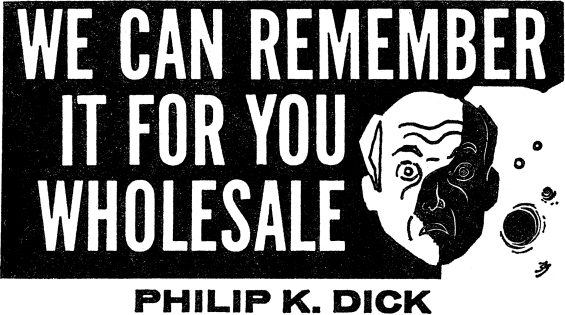The index to the entire Joss Whedon roundtable is here.
_________
One of the core philosophical mysteries that Philip K Dick lingered over throughout his career was the fragility of identity (and, by extension, reality). In particular, “We Can Remember It For You Wholesale” twists a very knotty philosophical quandary into one of PKD’s more intense action stories. Typically, PKD is more concerned with perception of reality but “We Can Remember…” focuses more intimately on the mutability of memory and its relationship with identity. The protagonist, one Douglas Quaid, undergoes a procedure to gain a desired false memory, only to stumble onto buried memories that shatter his identity, replacing his mundane life with that of a government assassin.
Sound familiar?
If you’ve ever seen Joss Whedon’s Dollhouse and aren’t already acquainted with the plot of PKD’s seminal work, also adapted into film twice now, you’ll be now quite aware that “We Can Remember…” is the foundation upon which the show is based. If you haven’t seen it, here’s a crude summary; a corporation erases people’s identities and replaces them with useful identities until their debts are paid off.
One of the reasons why “We Can Remember…” seemed worthy of modernization as a TV series wasn’t just the possible complexities of a world where identities can be manufactured but the subtle thread of dystopianism, one that predates William Gibson’s corporations-as-gods cyberpunkism. In both Dollhouse and “We Can Remember…”, the powerful corporations responsible for identity manipulation don’t serve as arms of a nameless government but act independently of them and at odds with them, even.
In “We Can Remember…” it’s REKALL, the corporation, who triggers Douglas Quaid’s memories of his job as a government assassin and it’s left to the government to deal with the problem, though it’s again REKALL who provides the final resolution, or at least an intended one. It’s dystopian in the whole sense; Quaid was a government assassin who, had things gone according to plan, would never have awoken to his former identity and it is actually his false identity in denial of this that leads to the central conflict. “Real” Quaid, the government he worked for and REKALL are all complicit.
Dollhouse, on the other hand, is openly anti-corporation and, in its implications, a cautionary tale whose formula is “corporations + technology = bad.” This starts with the implication that Rossum Corporation took an invention intended to alleviate neurological disorders and turned it to arguably nefarious ends, and ends with a near-apocalypse. The depiction of the creators of this technology, as well as most of the technologically-inclined characters, is of sociopaths. Whedon’s Dollhouse has little sympathy for scientists and barely touches on the humanitarian uses of the Dollhouse technology.
On the other hand, in Philip K Dick’s “We Can Remember It For You Wholesale,” the existence of mind-altering technology is far more benign and pragmatic than Whedon’s. REKALL runs a business granting people the chance to have memories of experiences they never had or to take on an identity they wish they could be. There’s no apocalyptic endgame and, to that extend, Dick seems to acknowledge the mundanity of postmodern culture in which everything is changing but nothing is different. In fact, he’s not even concerned with it, instead punctuating his tale with a very PKD-ian twist from out of left field. Dick was telling a story and not running a simulation revolving around a theoretical technology, one in which the driving individuals are improbably corrupt, as those in Dollhouse seemed to be.
And therein lies the disconnect of Whedon’s riff on PKD; Philip K Dick was writing Weird science fiction, with a capital “W.” The universe he portrayed in his books, unlike Whedon’s Dollhouse (and, perhaps more tellingly, Firefly), was ultimately an irrational universe. PKD wasn’t really a science fiction author, not in the vein of Asimov or Clarke, but more a postmodern mutation of the old Weird, like Lovecraft for the hard disk era. The relationship between the two is even more stark if you consider Philip K Dick’s overriding affinity for “the beyond” and extrastellar and ungraspable entities. And, really, that’s what drives his dystopias; that what should seem patently absurd and surreal by our standards is rendered mundane by the plastic nature of his realities.
Whedon’s “dystopia” is of an increasingly common and wearying breed; one that doggedly tracks down a line of best fit, averse to outliers and designed not just to suspend disbelief but to lock the viewer into a meticulous and intricate conundrum. And Whedon’s solution to the whole thing is, bizarrely, a sort of anti-science deus ex machine; it turns out the secret to countering the mind-wiping technology is hidden away in a particular character’s DNA.
This last revelation feels like a loose thread that Whedon could’ve malevolently ripped clean from the scrupulously woven fabric of Dollhouse’s reality by implying that perhaps this miracle DNA isn’t of terrestrial origin. It certainly would’ve infused such an appallingly cynical story with some much needed weirdness, the kind of weird that made Philip K Dick’s works compelling.

